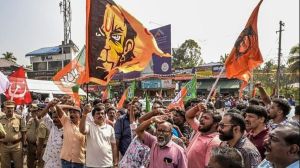On the run for six months? EC wants them out of polls
In an attempt to clean up the electoral process, beginning with Bihar, the Election Commission today asked the state government to delete, f...

In an attempt to clean up the electoral process, beginning with Bihar, the Election Commission today asked the state government to delete, from the electoral rolls, the names of those against whom non-bailable arrest warrants could not be executed for more than a period of six months.
The EC’s argument: If warrants could not be executed, it means that these persons are ‘‘not ordinarily resident at least for the last six months at their given addresses,’’ and, therefore, ‘‘should be deleted by the Electoral Registration Officers by taking suo motu action under Section 22 of the RP (Representation of People) Act 1950.’’
The presumption is that the person concerned was not available at his given address despite repeated visit by agencies (the police and the court) entrusted in the execution of those warrants.
This would also effectively debar them from contesting.
Incidentally, in the last assembly elections in Bihar more than thousand candidates with criminal charges pending against them contested elections as Independents or on tickets of regional as well as national political parties.
To enable the EROs to take this action, the EC has asked the Bihar Government to furnish to the Chief Electoral Officer (of the state) a complete list of persons with details of their residential addresses, against whom the NBWs have remained unexecuted for than six months.
To underline that it means business, the state government has also been asked by the EC to furnish the list by August 19. On the basis of this list, the district election officers would ensure that the names of such persons are deleted from electoral rolls by September 19.The EC’s legal basis: Section 3-6 of the RP Act, 1951, by which a person contesting an election to Parliament or State Legislature must be registered as an elector in a constituency. Therefore, a person ‘‘who is absent from his constituency for long periods and is not available to, or traceable by, the police authorities and the agencies entrusted with the task excuting NBWs, as a logical consequence, be presumed to be not ordinarily resident at that address,’’ the EC said. So, his names can be deleted from the electoral rolls.
Under Section 22 of the RP Act 1950, the name of a person who has ceased to be ordinarily resident in the constituency can be deleted by the EROs at any time before the last date for the nomination of candidates at an election from the constituency. ‘‘It is common knowledge that many of these proclaimed offenders/absconders have been contesting elections,’’ the EC said.
At the time of the last Assembly elections in Bihar, the Patna high court gave a direction that if any such proclaimed offender/absconder turned up for filing his nomination papers, the police authorities should arrest them and produce them before the court. Following this, several persons were arrested by the police when they came to file their nominations, but, in many other cases, these absconders evaded arrest by getting their nomination papers filed through their proposers, the EC said.
- 01
- 02
- 03
- 04
- 05






























